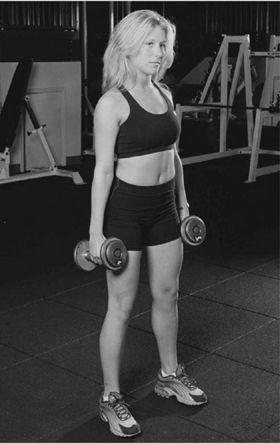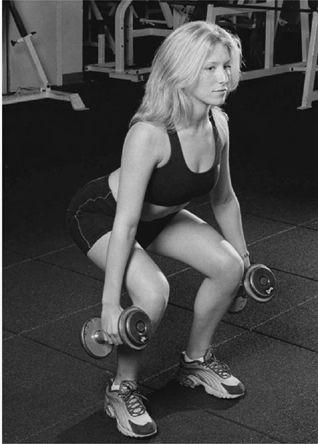The Body Sculpting Bible for Women (27 page)
Read The Body Sculpting Bible for Women Online
Authors: James Villepigue,Hugo Rivera
Tags: #Health & Fitness, #Exercise, #General, #Women's Health

 As you reach the top of the movement, make sure you do not lock your knees since it will put too much stress on the knee joint. If at any time during the movement you should notice yourself getting sloppy or not retaining the proper alignment, stop immediately! Never jeopardize your safety with bad form!
As you reach the top of the movement, make sure you do not lock your knees since it will put too much stress on the knee joint. If at any time during the movement you should notice yourself getting sloppy or not retaining the proper alignment, stop immediately! Never jeopardize your safety with bad form!
 When you’ve done the desired amount of reps, squat down once again and place the dumbbells on the floor or place them back on the dumbbell rack. Never bend over to pick the dumbbells up or put them down. Doing this can injure your lower back area.
When you’ve done the desired amount of reps, squat down once again and place the dumbbells on the floor or place them back on the dumbbell rack. Never bend over to pick the dumbbells up or put them down. Doing this can injure your lower back area.
FAQ:
Because I don’t have a barbell on my back, can I assume that the dumbbell squat will not bother my aching lower back?
Answer:
Whether you’re doing squats with a barbell or a dumbbell, your back will be affected. Your objective must be to maintain proper form, anatomical alignment, and technique, from the beginning until the end of the exercise. if you get sloppy with any of these three elements, you risk the chance of injuring your lower back. The squat can be a very safe and effective exercise, so long as you are cautious enough to make it work.
Ballet Squat
This exercise is to be performed the same way as the barbell or dumbbell versions with the exception that your foot stance will be wider than shoulder-width. This variation will yield a stronger emphasis on the inner quads. Some women are afraid that a wide stance will give them a big butt and hips. This is not true. A wide-stance squat can actually help shape the quadriceps and the inner thighs. You must make sure, though, that you don’t have too wide a stance. An overly wide stance can cause knee problems and possibly generate painful groin pulls. A good stance is about 1-1/2 times shoulder width with the toes pointed outward at a minimum of 25-30 degrees. No matter how wide your stance, your ankles should always remain in line with your knees. A good indication that a stance is too wide is when the ankles are outside of the knees in the bottom position of a squat. While you are discovering the width of stance best suited for you, don’t worry about the amount of weight to use. Instead concentrate on your overall technique with your adjusted stance.
PROPER ALIGNMENT
 Hold a dumbbell in each hand with arms extended down and palms facing your body or a barbell on your back with your arms holding the barbell in place.
Hold a dumbbell in each hand with arms extended down and palms facing your body or a barbell on your back with your arms holding the barbell in place.
 Align your body from the bottom up by first taking a 1 1/2 shoulder-width stance.
Align your body from the bottom up by first taking a 1 1/2 shoulder-width stance.
 Slightly bend your knees and avoid locking them anytime during this exercise.
Slightly bend your knees and avoid locking them anytime during this exercise.
 Contract your abdominal muscles to help support and sustain your posture during exercise.
Contract your abdominal muscles to help support and sustain your posture during exercise.
 Stick your chest out and simultaneously bring your shoulder blades back, keeping them there throughout the movement.
Stick your chest out and simultaneously bring your shoulder blades back, keeping them there throughout the movement.
 Keep your head level at all times. Make sure your head and your eyes do not drop down or wander upward excessively as this is an easy way to lose your balance and fall. We would rather you look slightly above level, rather than below, as looking below level can greatly affect your equilibrium and jeopardize your safety 7 If you feel unstable, you may put small two pound plates under each heel for stability.
Keep your head level at all times. Make sure your head and your eyes do not drop down or wander upward excessively as this is an easy way to lose your balance and fall. We would rather you look slightly above level, rather than below, as looking below level can greatly affect your equilibrium and jeopardize your safety 7 If you feel unstable, you may put small two pound plates under each heel for stability.
TECHNIQUE AND FORM
 When you think you have properly aligned yourself, repeat the alignment steps, starting from the bottom and moving up. Once you have secured your alignment, prepare to inhale as you begin your descent.
When you think you have properly aligned yourself, repeat the alignment steps, starting from the bottom and moving up. Once you have secured your alignment, prepare to inhale as you begin your descent.


